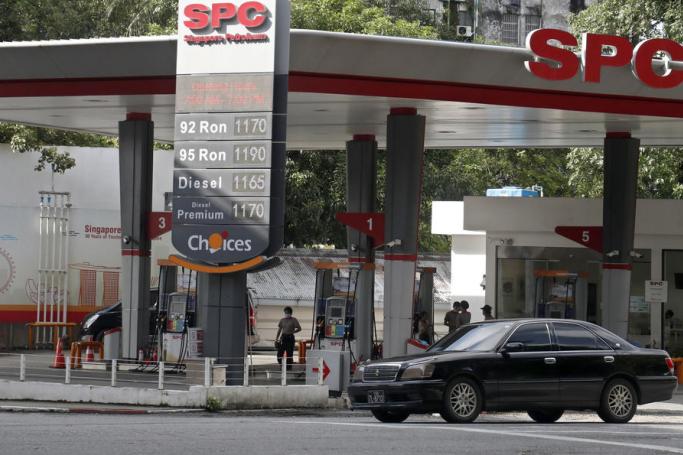Rationing of fuel supplies in Yangon and other large cities might be extended for several days, according to representatives of fuel businesses.
Since 19 April there has been panic buying and long queues at petrol stations in several major cities, because of low supplies of petrol and diesel. Some petrol stations have had to close temporarily and others are only allowing each vehicle to purchase 20,000 to 30,000 kyats worth of fuel.
Fuel businesses said that imports had been disrupted by new rules imposed by the Central Bank of Myanmar this month that force people to convert foreign currency into Myanmar kyats within 24 hours of receiving the foreign currency.
They also suggested that the same regulations were responsible for people panic buying fuel. “The 3 April statement by the Central Bank of Myanmar and the restriction of the foreign exchange rate to 1,850 kyats to a dollar has caused trouble and affected the country’s businesses”, said someone who works in the fuel industry.
“It is normal to run out of fuel on the last day of the Thingyan Holidays, but what has happened this year is that because of the new foreign exchange rate policy some stations that had already paid over 2000 kyats per dollar to buy fuel were losing money. That’s why some stations were closed.
Besides, some importers and fuel business owners stopped importing fuel and closed stations due to the pressure of selling fuel at low prices during Thingyan. After the end of the Thingyan holidays, the banking system was not yet operating well and the Central Bank did not release the dollars [in time] for them to make their orders. That is how the problem began. We are not even importers ourselves; we are just bidders”, said a fuel businessman from the Ayeyarwady Region.
Because fuel businesses cannot afford to sell at the current, mostly static exchange rate of 1,850 kyats per US dollar enforced by the Central Bank it has led to the temporary closure of businesses. Many of the closed petrol stations either say that they are closed because they need to clean their fuel tanks or because they do not have any fuel.
Some businesses in Yangon that used electricity generators had to immediately shut down their generators and faced further difficulties getting more fuel because of the shortages.
“Since the second day of the Myanmar New Year there have been power cuts, the electricity is on for four hours, then it’s off for four hours. When the power is cut some shops and factories manage to continue running by using their generators and stores of fuel, but others just have to wait until the lights come back on. I have just seen that some restaurant owners have posted [online] about similar issues”, said a steel and hardware materials trader.
Because they had no advance warning of the fuel shortages taxi drivers and freight forwarders are facing difficulties.
A freight forwarder said: “It is worse for taxi drivers than before. We freight forwarders are also struggling.”
Though the junta media has announced that there is enough fuel for the public there have still been long queues at petrol stations.
The rumours have also caused queues at petrol stations in Mandalay.
According to car drivers 92 octane petrol, the most popular sort of petrol, is about 2,000 kyats a litre and 95 octane petrol is about 2,300 kyats per litre.
Large petrol stations that import directly from abroad are continuing to sell fuel, but many other
petrol stations have temporarily closed.
In Yangon and Mandalay, long queues at the fuel stations are causing traffic jams.












